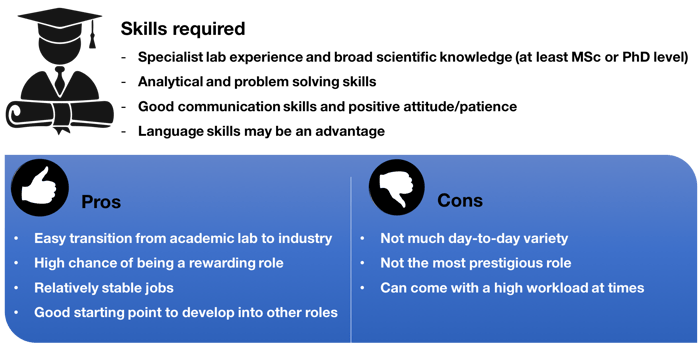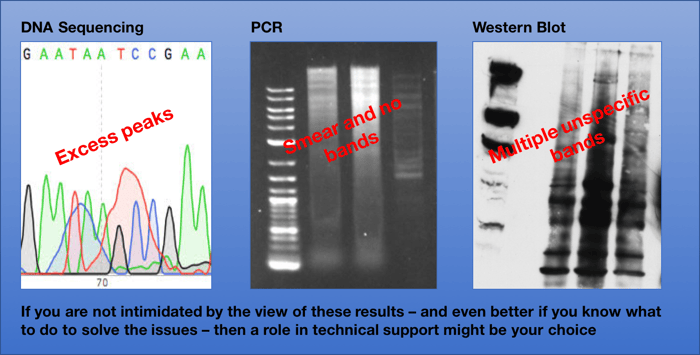
A degree in the life sciences prepares one for numerous non-academic careers. Still, many start their scientific careers hoping to follow the traditional academic route (find tips for getting a faculty position here). Possible roadblocks only become obvious at rather late stages (i.e. postdoc level) and can include the pressure to publish in high-impact journals, and the requirement for a high grant success rate. At this point, candidates are highly experienced but often have to start pursuing other options.
While some non-academic career options require additional study for late career scientists to become more appealing on the job market (e.g. a postgraduate degree in law, an MBA, or similar), there are many roles out there that require exactly what life science PhDs can offer: vast practical lab expertise, experience in different scientific fields, and knowledge of how to troubleshoot problems at the bench. Specifically, roles in technical support make excellent use of the skills developed by life science PhDs.
In my days as junior postdoc I was aware that such roles existed, but did not consider them for myself. I started picturing myself in a technical support role only when I was confronted one day with a product issue in the lab. The issue was with a custom-made reagent to manipulate cells (manufactured by one of the larger biotech companies), and as far as I remember, it was the first time that I was absolutely convinced it was the company’s fault. I contacted them to express my concerns and request a replacement. I got my replacement in the end and the issue was resolved - but it was a rather painful to get there: I had to send the company detailed documentation of my results, answer loads of questions, and I also had to do some troubleshooting as advised by the technical support person. This delayed the progress of the project.
After that rather unpleasant experience I thought: I could do this job so much better. Driven by that, I successfully applied and worked as a technical support specialist for 4 years. Read on for insights from my time in technical support including tips, advantages, and disadvantages of this overall rewarding role.
Learn about Other Addgenies and Their Careers in Our Career Videos
What's required for a role in technical support?
It takes some time (several years) to build up comprehensive lab experience. With this valuable training behind you (and largely only that is necessary), there are opportunities to work for biotechnology companies and help other researchers use the company’s products successfully. In technical support you may have to answer technical enquiries such as:
“Can I use this product under conditions different from those specified on its data sheet?”
or
“Do you have additional data regarding the specificity of this antibody?”
You will also help troubleshoot products, give general experimental guidance, and resolve complaints about products.
As you might expect, different companies produce different products and therefore need people with different areas of expertise in technical support positions. When applying for technical support positions, you should try to match your expertise with that of the company. To increase your chances at successfully applying for a position, you should familiarize yourself with technical support. Even having personal experience with technical support through the customer’s perspective is good. If you’ve never participated in a customer support conversation, just go ahead and contact a technical support team with a question or two that open a dialogue. This will give you a feeling of what might be involved in such a role. In addition, it can be advantageous to speak multiple languages - that makes communication with customers from around the world easier. You should also demonstrate a strong willingness to help others with their problems, a general positive attitude, and an open-minded personality.
These traits will help you deal with any incoming requests or problems - there is considerable diversity in the types of questions customers ask, and there are also differences in customers’ personalities and their expectations. If you are willing to listen to a customer’s concerns and are patient enough to find the real issue, you will do well in a technical support role.
What general characteristics do jobs in technical support have?

There are different names for technical support roles. Examples are Technical Service Representative, Technical Support Specialist, Technical Support Advisor, Technical Correspondent or similar. While there isn’t a clear distinction between these job titles, they may be different regarding the levels of lab experience and scientific knowledge they require. Biotechnology companies vary to what extent they hire experts for their technical support, and a PhD is not always necessary. The job description and the candidate requirements (and maybe also the proposed salary range) should help.
In smaller companies, technical support is often covered by the lab based team as part of their general job duties. Bigger companies have dedicated technical support teams, sometimes comprised of several layers of support: A front-line team accepts any incoming requests and answers questions that are less time consuming and/or less technically challenging. Alongside there is a second-line team that takes on cases requiring in-depth analysis, data review, in-house testing etc.
Technical support roles are primarily office based, and email/phone are the most popular ways to communicate with customers. Online live chat is a convenient alternative for asking a quick question or making initial contact, but is less suitable for troubleshooting or issuing replacement products. In order to find good and helpful answers for customers, internal resources and databases are scrutinized, and this information is enriched with your technical knowledge and judgement. For particularly tricky cases, team discussions can often lead to otherwise unobtainable solutions. To some extent there is the need (or opportunity) to get involved in product testing in the lab, to travel to customers’ sites, and to run experiments with/for them.
Though not the most prestigious role in a company, Technical Support is essential for success. For possibly this same reason, it can be one of the more constant and safe corners in a company, less exposed to the fast dynamics and pressure which are often found in sales or lab-based roles in industry.
What to look forward to in a technical support role
Talking to customers everyday, it can be fascinating and exciting to listen to the many individual stories and get (sometimes refreshing) insights into how other scientists think and work. Most certainly there won’t be a shortage of amusing reports where someone tries to “optimize” a particular standard lab protocol. For example, someone may attempt super quick incubation times in a Western Blot protocol and then blame the antibody when no signals are obtained. Or someone may heat an ELISA plate during incubation steps in order to enhance the OD signals and then complain about high background.
In many instances, variations of the product’s specific application instructions or “optimized steps” can be linked to having actually caused the problem. It may not always be straightforward to identify those crucial details because there are just so many things which can go wrong in a lengthy protocol. And customers may tell all sorts of details about the application, just not the ones that matter. Therefore, if there is a bit of a Sherlock Holmes in you – a technical support role is the right place to live it out, but ideally without asking too many (annoying) questions. Identifying and solving problems are the most rewarding parts of the job. Solutions may also be achieved by simply replacing the product in question. This can solve the problem in a simple way even if you don’t exactly know why.
Personal and professional development in technical support roles
A job in technical support can add a variety of skills to your CV and lead to other job opportunities (though it is not uncommon for someone to stick with technical support for the long term). First and foremost, technical support gives you the opportunity to develop interpersonal and communication skills. Problem solving and analytical skills are prerequisites but these too can be enhanced on the job.
When dealing with customers, you must be polite, friendly, patient, attentive, empathetic, and tactful. Occasionally it can also be necessary to take the lead and be assertive. You develop an understanding of when to use these communication skills by working with people from many different backgrounds and realizing that the same approach does not work for everyone. The benefit is that these skills are highly transferable and will help you enter other roles in project management, consulting, scientific outreach, and more.
Technical support roles also involve interacting with other departments such as research and manufacturing, quality assurance, product management, marketing, and sales (to name a few). Depending on the particular company structure you may be able to move into one of these departments from technical support.
Technical support careers in brief
Technical support careers are open to experienced professionals with strong interest in the technical aspects of science and the drive to help others. These roles offer an easy transition from an academic lab to industry without being too commercial or “sales-y”. The work includes reviewing customer data sets, troubleshooting protocols, analyzing information, and solving customer problems. Technical support can be highly rewarding but can also be a good jumping off point for other roles in industry.
Many thanks to Eric Perkins and Stephanie Hays for images used in this post.
 Klaus Wanisch is an Outreach Scientist at Addgene. These days he's doing a lot of science communication, and is particularly excited to hear about novel developments in the fields of gene and cellular therapies.
Klaus Wanisch is an Outreach Scientist at Addgene. These days he's doing a lot of science communication, and is particularly excited to hear about novel developments in the fields of gene and cellular therapies.
Additional Resources on the Addgene Blog
- Read What Do I Do Now? Academic v. Non-Academic Career Decisions
- Learn about Science Career Options
- Explore Tips for Technical Support Calls
Resources at Addgene
- Visit the Addgene Careers Page
- Check Out Our Career Videos
Topics: Science Careers, Science Career Options






Leave a Comment